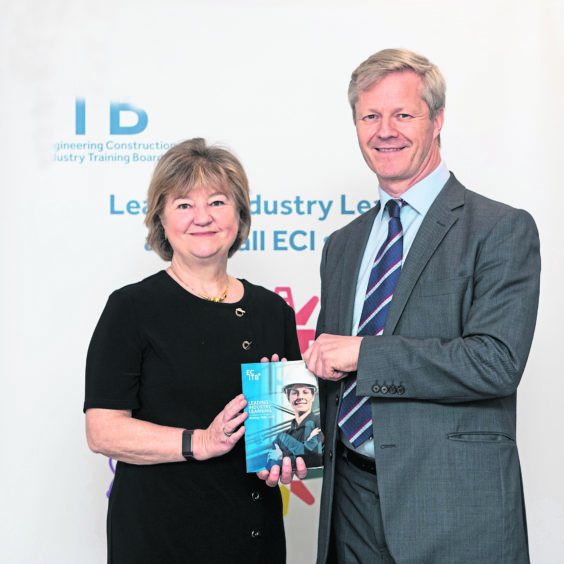
The Engineering Construction Industry Training Board (ECITB) has launched its new three-year strategy, which aims to steer companies through the growing challenges that lie ahead from now to 2022, and beyond.
Leading Industry Learning: Strategy 2020-22 is the culmination of a six-month consultation carried out by the government skills body which, in the north-east, supports the engineering construction industry activities of the upstream oil and gas sector.
While the business environment in the oil and gas industry is starting to recover from the recent severe downturn, it is clear that this is not yet making an impact within the supply chain.
Margins remain tight with competition for skills and inflation of rates being reported, which is reflected across the rest of the country.
The good news, however, is that there is increased optimism and more companies are looking to diversify their portfolios, while work on large scale maintenance programmes in the UK Continental Shelf will continue for decades to come.
As part of the consultation process, employers from a range of engineering construction companies around the UK were asked about their skills needs both now and in the future.
Four particular areas were identified:
Competition for skills – With £600 billion worth of infrastructure projects set to be delivered by 2022, engineering construction employers face growing competition for skills from other sectors, including projects such as HS2 and Crossrail 2. Coupled with the impact of Brexit, unless addressed, skills shortages will grow.
Industry 4.0 – New data-driven technologies will transform how businesses and their workforces operate. The ECITB’s recent report into the impact of industry 4.0
illustrates the benefits of the new technologies, but that there are significant barriers to adoption. New skills will be required and training must be developed to enable industry to remain competitive.
Demographic change – By 2026, 14% of the current engineering construction industry workforce will have retired. Coupled with the increasing competition for skills from other industries and sectors, the industry needs to attract more young and diverse talent, while retaining and, where necessary, re-skilling the current workforce.
Competent workforce – A safe, skilled and productive workforce is essential to ensure the delivery of projects safely, as well as on time and budget. Competence systems should also enable the transferability of the workforce to ensure that they meet the diversification of the energy sector.
To ensure these challenges are met, ECITB’s new strategy includes an undertaking to meet skills needs by committing at least 70% of its expenditure to support current training, as well as up to 30% to ensure industry has the skills it needs for the coming years.
In the north-east, ECITB already has a proven track record of delivering innovative project management development activities that promote knowledge sharing and collaborative working within the sector, including its flagship mentoring scheme and the Project Collaboration Toolkit (PCT).
The Oil and Gas Industry Project Management Mentoring Programme, now in its fifth year, allows qualified and experienced project practitioners to “mentor-forward” year-on-year. More than 50 participants have already benefited and it has proved to be an excellent way of sharing learning and experience from delivery of oil and gas projects, something that is vital to the future wellbeing of the sector.
The PCT, launched in 2016, is a go-to guide that gives a tangible framework within which to focus on the behavioural principals of collaboration, at any phase in a project.
Meanwhile, growing numbers of individuals are also successfully completing the APM Registered Project Professional, a pan-sector standard for those able to demonstrate the capabilities of a responsible leader with the ability to manage a complex project and a recognised route to becoming a Chartered Project Professional (ChPP).
Another key initiative the ECITB is leading and supporting is the delivery of Connected Competence within the oil and gas sector, with plans to roll out more widely throughout the UK engineering construction industry.
Connected Competence is an exercise in standardising technical competence of the workforce, increasing productivity, assisting transferability and shortening mobilisation times.
ECITB chief executive Chris Claydon said that the new strategy also commits to investment in new technologies and innovation, as well as the recruitment of new entrants.
“The engineering construction industry is at a critical juncture and the importance of collaboration to ensure a sustained economic recovery cannot be underestimated,” he said.
“In the face of the continued challenging climate for the engineering construction industry, it is vital that ECITB ensures that the right training is available at the right time. While profit margins are tight in many sectors, engineering construction is seeing signs of recovery. However, with the number of major new infrastructure projects currently under way and scheduled for the future, it is crucial industry has the skilled people it needs.
“By preparing for the future, embracing new technology and recruiting new-starts to replace our ageing workforce, we will help employers meet their current and future skills needs.
“We look forward to engaging with industry over the coming months to discuss how best this can be achieved.”
For more information about both the ECITB strategy and technology report, please go to www.ecitb.org.uk
Recommended for you
